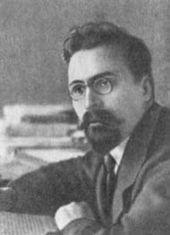Lev Mikhailovich Karachan
Lev Michailowitsch Karachan ( Armenian Կարախանյան Լեւոն Միքայելի, Russian Лев Михайлович Карахан ; born February 1, 1889 in Tbilisi , † September 20, 1937 in Moscow ) was an Armenian - Russian revolutionary and Soviet diplomat .
The son of an Armenian lawyer residing in Tbilisi joined the Social Democratic Workers' Party of Russia in 1904 as a student , originally joining the Menshevik faction ; in May 1917, however, he became a member of the Bolsheviks .
After the October Revolution of 1917 he was initially appointed to the Revolutionary Military Council of the RSFSR ; in 1918 he took part in the peace negotiations in Brest-Litovsk as a member of the Russian delegation (together with Leon Trotsky and Adolf Joffe ) . From 1918 to 1920 and again from 1927 to 1934 he acted as Deputy People's Commissar for Foreign Affairs ; As part of this activity, he wrote the so-called Karachan Manifesto on July 25, 1919 , in which Soviet Russia waived all special political rights and claims of the former Tsarist government in China; This declaration represented the first such expression of equal and friendly relations between a major European power and China and was therefore extremely well received. In 1921 he was appointed Russian ambassador to Poland ; from 1923 to 1927 he took over the position of the Soviet ambassador to China. After 1934 he worked as an ambassador to Iran and Turkey . In 1930 he married the ballet dancer Marina Semjonowa . Karachan was arrested in Moscow during the Stalin Purge in 1937 and executed on September 20th .
Web links
- Newspaper article about Lev Michailowitsch Karachan in the 20th century press kit of the ZBW - Leibniz Information Center for Economics .
| personal data | |
|---|---|
| SURNAME | Karachan, Lev Mikhailovich |
| ALTERNATIVE NAMES | Карахан, Лев Михайлович |
| BRIEF DESCRIPTION | soviet diplomat |
| DATE OF BIRTH | February 1, 1889 |
| PLACE OF BIRTH | Tbilisi |
| DATE OF DEATH | September 20, 1937 |
| Place of death | Moscow |
